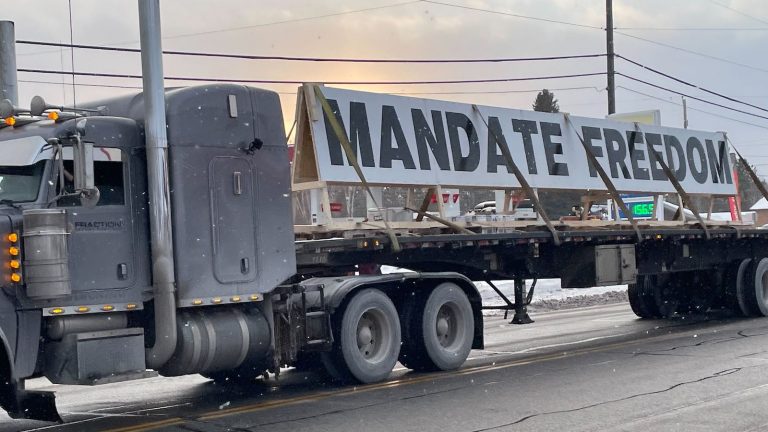Since the COVID-19 vaccines became widely available, governments all over the world have begun implementing mandates requiring citizens to take the jab. Some of these mandates, like the one the U.S. Supreme Court just recently struck down, are tailored to certain subsets of people or only apply to people engaging in certain activities. Others are applied broadly enough that they’re essentially a prerequisite for living a normal life. While some people might be in favor of mandating vaccination, others see it as a violation of civil liberties and are choosing to resist rather than comply.
In almost every country that has implemented a vaccine mandate, protests have followed. In my view, these are all noble and worthwhile pursuits, but there’s one recent protest in particular that could potentially have an enormous impact on the overall movement against these oppressive policies. The protest I’m referring to is the large convoy of truck drivers that drove to the Canadian Parliament in Ottawa in an ongoing strike against a mandate that requires vaccination for all truck drivers that cross the U.S.-Canada border. The mandate affects roughly 20 percent of Canadian truck drivers, according to some studies. To make matters worse, the U.S. also has a similar rule in place.
What began as an industry-specific strike against a specific mandate has turned into a much larger movement protesting the government overreach Canada has seen over the pandemic.
The so-called “Freedom Convoy” has been condemned by Canadian Prime Minister Justin Trudeau as a “fringe movement” that doesn’t represent most Canadians’ views. While it may be true that many Canadians disagree with the protest, the large amount of support the convoy has received implies it’s not as small of a minority as Trudeau suggests. Since the convoy began they’ve received millions of dollars in a GoFundMe account, and images and videos of long lines of vehicles and crowds of people supporting the protest have circulated on social media. The protest has also seen support from some conservative politicians in Canada, as well as a nod from billionaire Elon Musk in a recent tweet.
One of the main arguments against the vaccine mandate (and this could apply to the U.S. mandate as well) is that it will exacerbate the ongoing supply chain issues. At a time when store shelves are missing products and prices are rising, it seems like a poor decision to create another burden for our supply chains, especially considering the isolation that the job in question naturally entails. On a similar note, it never ceases to amaze me that the very people we rightly praised in 2020—truckers and health care workers, for example—are now being forced to choose between their occupations or their right to make their own medical decisions.
In the days leading up to the convoy arriving in Ottawa, officials began to warn of the possibility of violence, even though the organizers of the demonstration maintained that their intention was for a peaceful protest. As is the case with any large group of people, it’s entirely possible that some supporters of the convoy hold extreme views, but so far that hardly seems to be what the overall movement is about and as of now it appears peaceful. The protest began Saturday, January 29, 2022, but people began arriving on Friday ahead of the scheduled date with the protest expected to last all weekend.
As I mentioned earlier, this is just one of many protests that have taken place all over the world in response to governments imposing harsh public health measures, ostensibly for the sake of combatting COVID-19. While these protests receive little attention from the corporate media, that doesn’t mean that they aren’t significant, and we should all pay attention to these people who are taking a stand against what they deem are violations of their civil liberties. Whether you agree with getting the COVID vaccine or not, is not the issue. The underlying theme of these protests is that of personal choice and individual liberty.
The vaccines don’t prevent infection or transmission of COVID-19. What they do prevent is severe illness and death for those who choose to get vaccinated, and even that efficacy wanes over time without a booster—particularly when talking about the omicron variant. Considering this, I’m unsure how one can argue that these mandates are about safety when the chance of spreading the disease is just as likely in both vaccinated and unvaccinated people. The only danger caused by being unvaccinated, as well as any benefits (or risks) of being vaccinated, happens on an individual level, and therefore, deciding to take the vaccine should be an individual choice.
Let’s hope that the Freedom Convoy and other protests like it can remind our world leaders of that, and have a positive impact on medical freedom and more broadly, on liberty overall.














[…] recently, hundreds of thousands of semi-trucks, tractors, heavy equipment, and people descended into Ottawa, […]